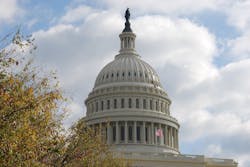Senate Passes $1 Trillion Bipartisan Infrastructure Investment and Jobs Act
The U.S. Senate passed the Infrastructure Investment and Jobs Act after months of bipartisan negotiations between the Biden Administration and a bipartisan group of Senators.
According to The New York Times, the vote was 69-30. The bill would direct $550 billion in new federal spending toward infrastructure projects across the U.S.
For the water industry, $55 billion of the $550 billion will go towards clean drinking water and wastewater infrastructure. The bill’s provisions for the water sector include:
- $11.713 billion each for both the Clean Water State Revolving Fund and the Drinking Water State Revolving Fund (SRF) for a total of $23.5 billion in new federal investment;
- An additional $1 billion through the CWSRF and $4 billion through the DWSRF to address emerging contaminants including per- and polyfluoroalkyl substances (PFAS);
- $15 billion through the DWSRF to address lead in drinking water;
- Reauthorizing the Sewer Overflow and Stormwater Reuse Grants program at increased funding levels;
- And at least $25 million per year to improve access to running water in Tribal nations and disadvantaged communities.
According to the White House Fact Sheet regarding the infrastructure bill, it is also intended to prepare more of our infrastructure for the impacts of climate change and resulting extreme weather events. This is the largest investment in the resilience of physical and natural systems in American history.
The Association of State Drinking Water Administrators Regulatory and Legislative Affairs Manager Wendi Wilkes tweeted several findings regarding the bill's water and wastewater provisions.
Industry associations including National Clean Water Association (NACWA), The American Society of Civil Engineers (ASCE), and the Association of California Water Agencies (ACWA) applauded the passage of the bill in the Senate and provided statements to capture their feelings towards the investments in water.
According to NACWA’s statement, the bill contains authorizations for new key clean water programs, including requiring U.S. EPA to conduct a study of low-income water assistance needs in the U.S. and authorizing the Agency to stand up a pilot program of federal assistance for low-income households.
Despite these strides, NACWA points out that the investments provided are only roughly half the amount initially proposed for water in an infrastructure bill.
“The Infrastructure Investment and Jobs Act passed today by the U.S. Senate marks a hopeful turning point in the federal government as a renewed funding partner with states and local communities in providing public clean water services,” said Adam Krantz, Chief Executive Officer of NACWA, in a statement. “NACWA strongly supports this bipartisan bill and applauds the White House and the Senate leaders who worked across party lines to negotiate this deal. However, there is still much work to be done and NACWA looks forward to continuing to see the process move forward and ultimately deliver strong support for the public clean water sector – a vital infrastructure sector which protects the public health and environment.”
The ASCE statement applauded the U.S. Senate for passing the bipartisan bill as well.
“With this legislation, the federal government will restore their critical partnership with cities and states to modernize our nation’s infrastructure, including transit systems, drinking water pipes, school facilities, broadband, ports, airports and more,” said ASCE in a statement. “We commend the Senate for prioritizing American communities by passing this bipartisan infrastructure legislation and urge the U.S. House of Representatives to do the same.”
ACWA also released a statement of support.
“We need to make major investments, including in water recycling, ecosystem restoration, desalination and storage projects to modernize and upgrade our water infrastructure to ensure local, safe, reliable, high quality water now and in future years. This bipartisan legislation accomplishes that,” said ACWA Executive Director Dave Eggerton in the statement.
Despite this historic feat, the measure will now face the House, where the speaker, Nancy Pelosi, and the nearly 100-member Progressive Caucus, have said they will not vote on it unless and until the Senate passes a separate $3.5 trillion social policy bill this fall, according to The New York Times.
